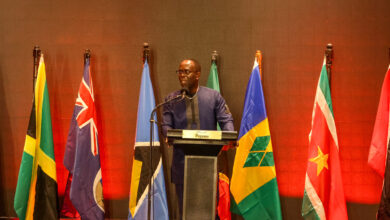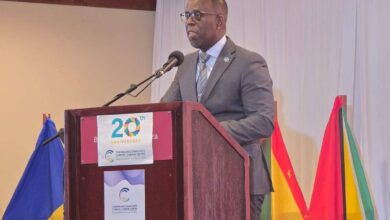As Secretary General of the Caribbean Community, it is not only a very special honour and privilege, but also a great pleasure to be able to offer these brief remarks on the occasion of the Twenty-fifth Anniversary of the Caribbean Community. The task is all the more pleasant for the fact that I had the good fortune to be at Chaguaramas to witness the signing of the Treaty, which transformed the Caribbean Free Trade Area (CARIFTA) into CARICOM on that historic Fourth of July 1973.
Twenty-five years of toil, trial and triumph have brought us here to Saint Lucia, the Helen of the West, in the heart of the Caribbean – physically and culturally – to celebrate this momentous event. From this very land, in the shadow of the majestic Pitons, the genius of Nobel Laureates Sir Arthur Lewis and Derek Walcott has reminded the world that the endowments of Saint Lucia, and indeed of the Caribbean Region, lie not only in its geography, but also in the quality of its people. Saint Lucia has given the Community much inspiration and much justification for pride. Today, therefore, we extend our thanks to its Government and people for more than the hosting of this historic Summit of Heads of Government of the Caribbean Community.
As the Twenty-first Century looms ever closer by the minute, and as the Community positions itself to ensure a secure and viable place therein, the experiences – successes as well as failures – of the past twenty-five years have clearly shown that acting in concert in pursuing our common interest – however difficult or frustrating at times – still remains our most effective choice.
There is undoubtedly much in that history of which we can be justifiably proud. Indeed, the very fact that this Community is today twenty-five years old, stamps it as one of the most enduring of regional integration movements in the developing world, and in the world at large, and it is perhaps second only to the European Union in this regard.
To keep together “an Association of Sovereign States”, as CARICOM is, on the same course through the rough currents of the international environment, is by no means an easy task. It will be no easier as the Community moves from being a six million English-speaking to a fifteen million English, Dutch- and French -speaking one by the inclusion of Suriname and soon of Haiti. And there may me others if we are to build a truly Caribbean Community.
Against this background I therefore wish today, on this most auspicious anniversary of the Community so far, in the limited time available to me, to pay tribute to all those who have contributed to the creation and development of this vehicle, for Caribbean social, economic, cultural and political development.
The pride of place must inevitably go to the Founding Fathers of Caribbean regionalism, particularly the political leaders, starting with those who commenced that long trek in 1947 from Montego Bay, to those present here in Castries in 1998. Among them a special place of honour would seem to fall naturally to the original signatories of the CARIFTA and CARICOM Agreements – the formal Instruments on which our regional cooperation rests.
It is therefore with a special sense of reverence that we recall the contribution of one of today’s four recipients of the Community’s highest honour – the Rt. Hon. V.C. Bird Snr – the only living signatory of both Instruments. The other three recipients today, His Excellency A.N.R. Robinson, Sir Philip Sherlock and Sir Garfield Sobers, have also made outstanding contributions to Caribbean regionalism in their various ways.
In this same breath, one must mention and pay no less tribute to the seminal contribution and the foundation laid by William Gilbert Demas, the first Secretary-General of CARICOM.
The achievements of the Community were of course not the work of the political leaders alone. They were ably supported by their ministerial cohorts and various technical advisers, all of whom are worthy beneficiaries of such encomium as falls to the Community at this time.
Similar recognition must be given to our various regional organisations, which from their differing standpoints and specialisations, have contributed significantly to the general regionalisation of our development efforts. Few among them can deserve greater mention than the University of the West Indies and the Caribbean Development Bank. The Community would always be in the debt of these Institutions – themselves virtually “part of the Community”.
I have left until this moment reference to the contribution of the CARICOM and OECS Secretariat. Working in harmony as these two central integration organisations do, they have, virtually from the very inception, provided the basic day-to-day support which fuels and drives the integration process.
Today I wish to convey to those two Institutions and their staffs, current and past, the gratitude of the Caribbean Community at large for the special contribution which their role represents. Their role will become increasingly critical as the integration edifice is enlarged. The modernisation and strengthening to improve their capacity to better service the growing integration process, should therefore be a subject for early consideration if the integration process is not to be retarded. And for their special role in housing the Headquarters of these Institutions, the Community also owes a debt of gratitude to the countries concerned.
The Regional integration process has generally been seen as a public sector process. In reality, Ladies and Gentlemen, neither its beginnings not its effective implementation has really been so. From the very earliest stirrings for regional economic cooperation, the private sector and the labour movement have been integrally involved. CARIFTA’s formation, its transformation into CARICOM, CARICOM’s effective implementation and hopefully its development into a Single Market and Economy, would all have benefitted from strategic leadership and participation of both the private sector and the labour movement. The Community at large must recognise these contributions.
In a very real sense, the Media – the Fourth Estate – fills a special and unique role in the integration process. It is the main medium through which the Community informs and is informed. It carries the message to and brings the message from the people at large. It is the single most vital inter-linkage between and among the Community. To the extent that the Community has undoubtedly achieved some measure of success, the media’s claim to contributing thereto cannot be denied or overlooked. Equally, to the extent that the Community has suffered its share of setbacks, the media cannot altogether distance itself therefrom.
The role of the Media in the integration process is a sine qua non of democratic development. Therefore, investment in its development must be a social priority.
The bouquets which we are today handing out to the various sectors of our regional society are without doubt well deserved. But no sector is more deserving of such recognition than the general population itself. It is the people who have maintained that abiding faith and hope – even though at times shaken – in regional togetherness, by whatever name it is called. It is that faith and that hope that in the end have sustained the process to date and will fuel the drive to higher levels of cooperation and integration.
It is also with that faith and hope that we all advance to the future. That future must be one designed to cater for a new century and the beginnings of a new millennium. The process and the content must however substantially involve the prime beneficiaries – the youth. It is their vision and their commitment, more than any assessment of past achievements, which must characterise that process.
The Community must therefore look towards forging instruments and mechanisms to provide the Region’s youth with ample access to Community policy formulation, decision-making and implementation. I commend this Vision to the Caribbean at large as we embark in search of what can yet be “the golden age” of Caribbean cooperation, integration and development.
May the Silver Jubilee Year of the Caribbean Community, therefore, mark a veritable “shift in gear” in the process of regional cooperation and integration.
Happy Twenty-Fifth Birthday, CARICOM!





